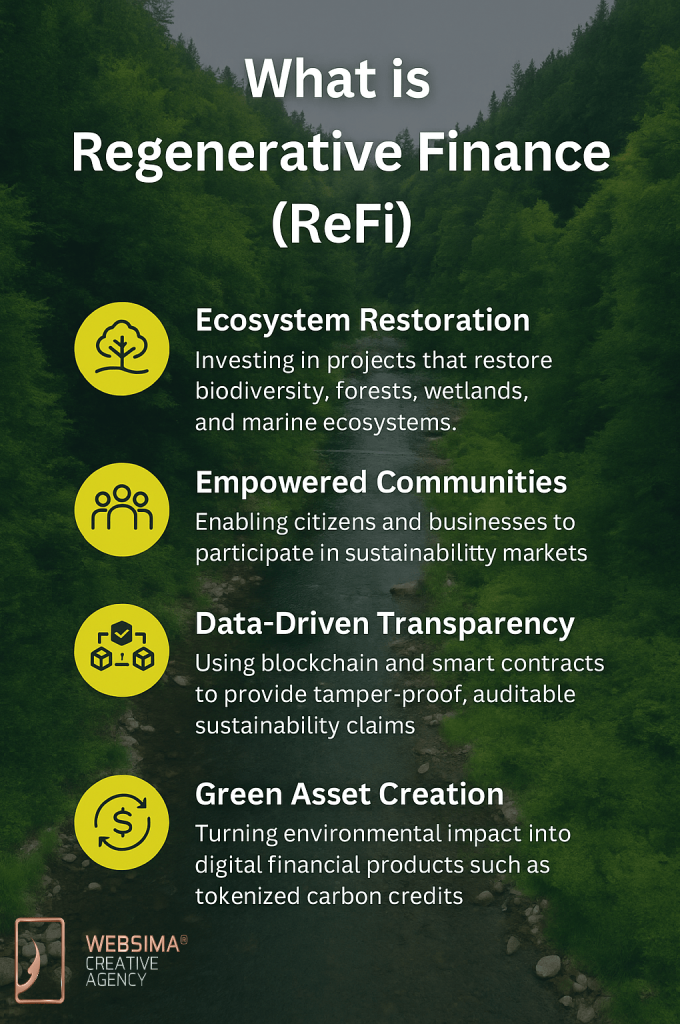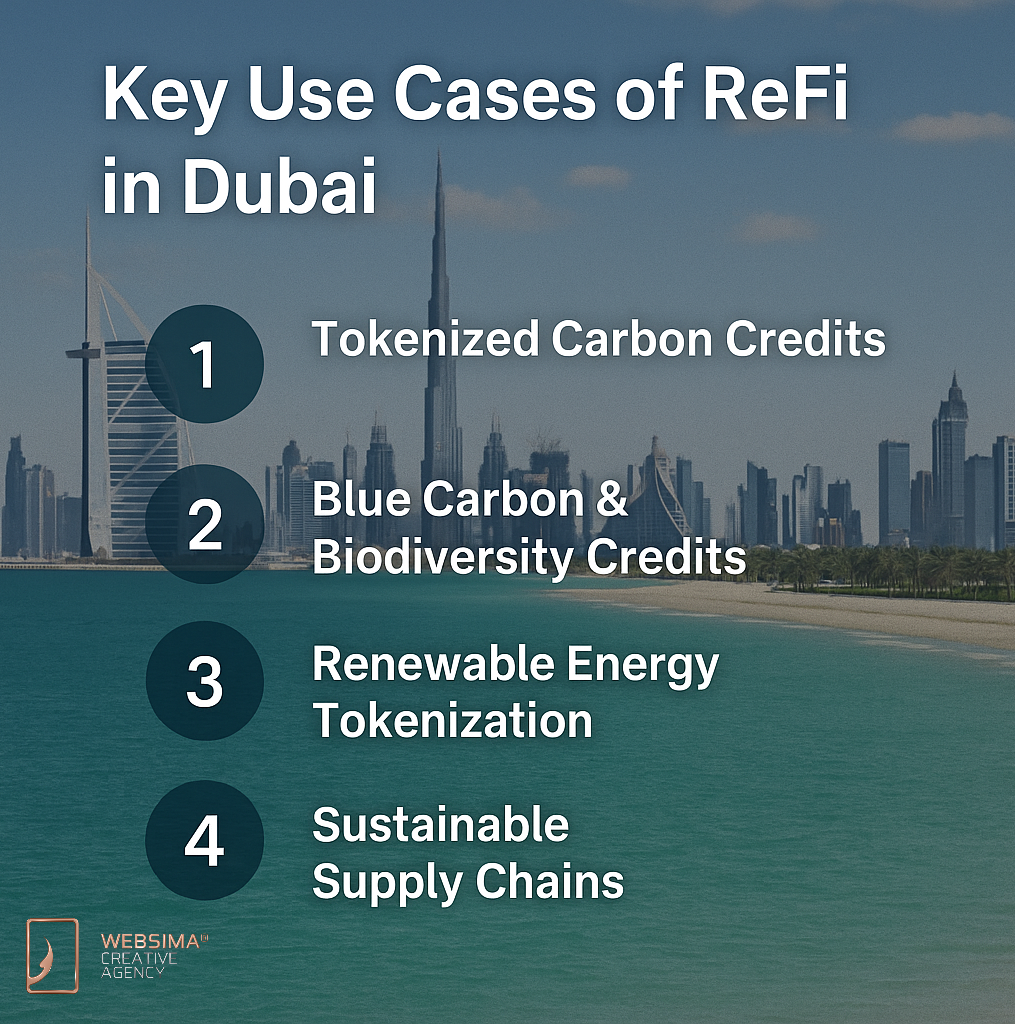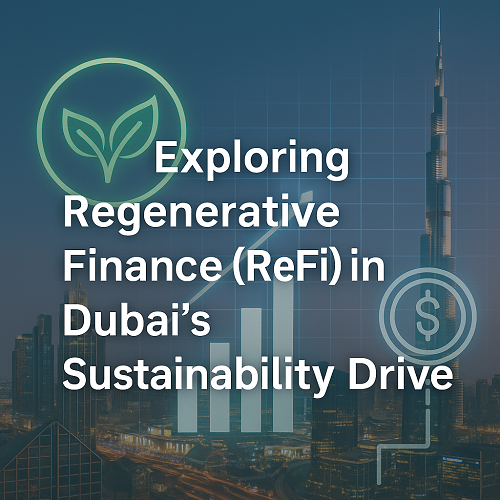Table of Contents
- Introduction
- What is Regenerative Finance (ReFi)?
- Why Dubai is Positioned to Lead the ReFi Movement
- How Blockchain Powers Regenerative Finance
- Key Use Cases of ReFi in Dubai
- Global Trends Driving Dubai’s ReFi Ecosystem
- Benefits of ReFi for Dubai’s Economy and Environment
- Challenges and Risk Mitigation
- Future Outlook: ReFi in Dubai by 2030
- FAQs on Regenerative Finance Dubai
- Conclusion
- Partner with Websima
Introduction
Dubai is at the forefront of sustainable innovation, blending economic growth with environmental stewardship. Backed by the UAE’s Net Zero by 2050 initiative and the Dubai Clean Energy Strategy 2050, the emirate is investing heavily in renewable energy, biodiversity restoration, and sustainability-focused infrastructure.
Amid these ambitious goals, Regenerative Finance (ReFi) has emerged as a transformative model. By leveraging blockchain technology, ReFi channels investment into projects that restore ecosystems, empower communities, and create measurable, verifiable impact.
“How can we power a world that never sleeps with energy sources that do?”
UAE’s renewable energy firm “Masdar” apparently has an answer: A $6 billion solar and energy facility in Abu Dhabi.
The new facility, set to launch in 2027, will combine 5 GW of solar capacity with 19 GWh… pic.twitter.com/jjcaAumHef
— Rothmus (@Rothmus) January 15, 2025
For Regenerative Finance Dubai, this isn’t just about achieving sustainability targets — it’s about redefining how financial systems contribute to environmental and economic progress.
What is Regenerative Finance (ReFi)?
Regenerative Finance (ReFi) is a blockchain-powered financial framework that funds projects designed to repair ecosystems, reduce emissions, and support community-driven sustainability initiatives.

Core Objectives of ReFi
- Ecosystem Restoration: Investing in projects that restore biodiversity, forests, wetlands, and marine ecosystems.
- Empowered Communities: Enabling citizens and businesses to participate in sustainability markets.
- Data-Driven Transparency: Using blockchain and smart contracts to provide tamper-proof, auditable sustainability claims.
- Green Asset Creation: Turning environmental impact into digital financial products such as tokenized carbon credits.
By embedding transparency and accountability, Regenerative Finance Dubai is shaping a trust-based ecosystem for climate-positive investments.
Why Dubai is Positioned to Lead the ReFi Movement
Dubai provides a unique convergence of policy, infrastructure, and innovation to support ReFi’s growth.
- Dubai Clean Energy Strategy 2050 → aims for 75% clean energy by 2050 (Dubai Clean Energy Strategy).
- Renewable Energy Mega Projects → the Mohammed bin Rashid Al Maktoum Solar Park will reach 7,260 MW capacity by 2030, cutting ~8 million tonnes of CO₂ annually (DEWA Solar Park).
- Blockchain-Friendly Regulation → Dubai’s Virtual Assets Regulatory Authority (VARA) has created a robust regulatory framework for tokenized sustainability-linked assets (VARA Rulebook 2023).
Besides the use of IoT and Blockchain in DEWA’s metering is further improving the regenerative finance across Dubai as well as the UAE. Dubai’s combination of sustainability vision, digital and smart infrastructure by integration of IoT and Blockchain, and supportive regulations makes it a natural leader in the global ReFi ecosystem.
How Blockchain Powers Regenerative Finance
Blockchain enables secure, transparent, and verifiable sustainability financing through:
| Blockchain Capability | Impact on ReFi |
| Tokenization | Converts carbon credits, biodiversity data, and renewable energy outputs into digital tokens with traceable metadata. |
| Smart Contracts | Automates payments and rewards based on verified project milestones. |
| Transparency | Creates a tamper-proof record of impact claims and asset flows. |
| Decentralized Funding | Empowers individuals, corporates, and investors to directly support regenerative projects. |
This trust infrastructure ensures that sustainability efforts are measurable, auditable, and investable.
Key Use Cases of Regenerate Finance in Dubai

1. Tokenized Carbon Credits
Dubai can pioneer digital carbon credit ecosystems:
- Tokenizing carbon credits makes them tradeable, transparent, and verifiable.
- Corporates can offset emissions efficiently while meeting ESG goals.
- Tokenized credits integrate directly with Dubai’s sustainability policies.
2. Blue Carbon & Biodiversity Credits
Dubai’s coastal ecosystems — mangroves, wetlands, and seagrass beds — provide opportunities to:
- Create blue carbon credits for marine ecosystem restoration.
- Fund biodiversity conservation projects via tokenized assets.
- Attract global impact-driven investors seeking verifiable sustainability returns.
3. Renewable Energy Tokenization
Dubai’s solar revolution opens up pathways for energy-backed tokens:
- Citizens can co-invest in renewable projects like the MBR Solar Park.
- Investors receive tokenized clean-energy credits based on measured outputs.
- Encourages public participation in Dubai’s transition to clean power.
4. Sustainable Supply Chains
Dubai’s status as a global logistics hub makes it an ideal base for green supply chain tracking:
- Tokenized certificates verify eco-friendly sourcing and product circularity.
- Corporates gain traceability and transparency for ESG reporting.
- ReFi platforms incentivize sustainable practices throughout trade ecosystems.
Global Trends Driving Dubai’s ReFi Ecosystem
Globally, tokenized climate finance is expected to exceed USD 250 billion by 2030. Dubai’s forward-thinking policies position it as:
- A hub for international carbon credit markets.
- A blockchain-powered sustainability leader.
- A magnet for global institutional investors seeking ESG-compliant green assets.
By leveraging blockchain transparency and policy alignment, Dubai can bridge local sustainability initiatives with global capital flows.
Benefits of ReFi for Dubai’s Economy and Environment
1. Accelerates Sustainability Targets
Drives Dubai closer to its Net Zero 2050 and Clean Energy 2050 goals.
2. Attracts Global Investment
Tokenized green assets open Dubai’s sustainability market to international ESG funds.
3. Diversifies the Economy
Introduces sustainability-linked digital assets to strengthen Dubai’s position as a Web3 innovation hub.
4. Empowers Local Communities
Allows citizens, startups, and SMEs to participate directly in funding environmental regeneration projects.
Challenges and Risk Mitigation
| Challenge | Mitigation Strategy |
| Regulatory Complexity | Build VARA-compliant ReFi platforms from the outset. |
| Data Integrity | Leverage digital MRV tools (IoT, satellites, and blockchain) for verified claims. |
| Market Adoption | Focus initially on high-demand products like carbon credits and renewable energy tokens. |
Future Outlook: ReFi in Dubai by 2030
Dubai’s ReFi ecosystem is projected to evolve rapidly over the next decade:
- Blockchain-powered carbon exchanges will become mainstream.
- Tokenized biodiversity credits will fund large-scale ecological restoration.
- Community-driven renewable energy ownership will be democratized.
- Dubai will serve as a global hub for high-integrity, tokenized sustainability markets.
FAQs on Regenerative Finance Dubai
Q1. What is Regenerative Finance?
A blockchain-powered model that funds ecosystem restoration and community-driven sustainability initiatives.
Q2. How does ReFi support Dubai’s sustainability goals?
It accelerates Net Zero by 2050 targets while ensuring transparent ESG reporting.
Q3. Is ReFi regulated in Dubai?
Yes. Dubai’s VARA Rulebook governs tokenized environmental finance platforms.
Q4. Who benefits from ReFi?
Corporates, investors, startups, citizens, and government-backed sustainability initiatives.
Q5. Can individuals participate in ReFi projects?
Absolutely — tokenized platforms enable fractional participation in carbon credits, renewable energy, and biodiversity restoration.
Conclusion
Regenerative Finance Dubai is more than a financial innovation — it’s a transformational framework for a sustainable, inclusive, and diversified economy. By aligning blockchain transparency with environmental goals, Dubai can drive global impact while cementing its leadership in green finance and Web3 ecosystems.
As ReFi scales, Dubai is poised to connect local climate solutions with global capital, making it a pioneer in sustainable economic transformation.
Partner with Websima
At Websima, we build next-generation ReFi platforms designed to thrive in Dubai’s evolving sustainability landscape.
Why Work With Us
- End-to-End ReFi Architecture → from tokenized carbon credits to biodiversity marketplaces.
- Digital MRV Integration → IoT, satellite, and blockchain pipelines for verifiable impact measurement.
- VARA-Ready Compliance → we design with regulatory frameworks in mind from day one.
- Investor-Ready Platforms → enabling global ESG funds to connect with Dubai’s sustainability markets.
Whether you’re a corporate tackling ESG mandates, a startup innovating in sustainability, or a government-backed initiative, Websima delivers scalable, secure, and regulator-compliant ReFi solutions.
Talk to Websima Today and be among the first movers shaping Dubai’s tokenized green economy.





